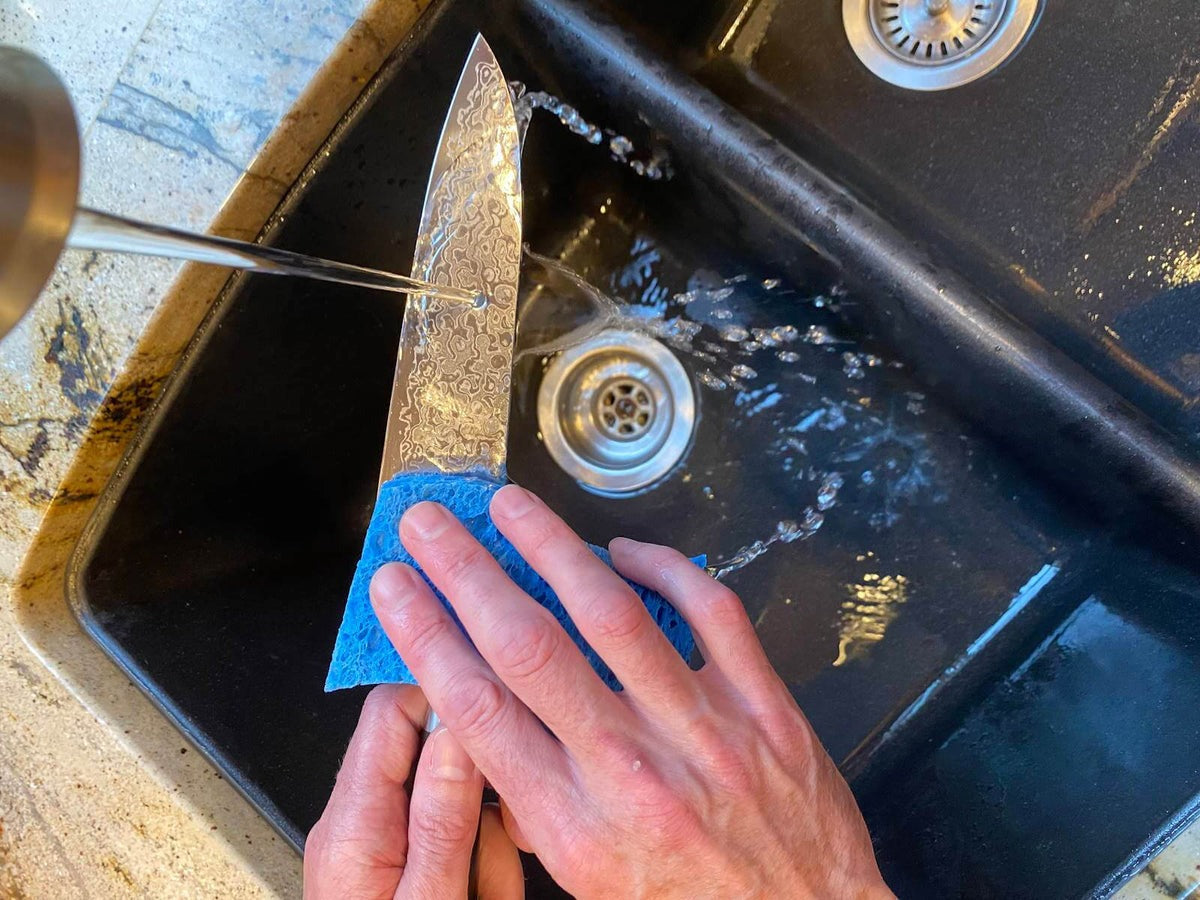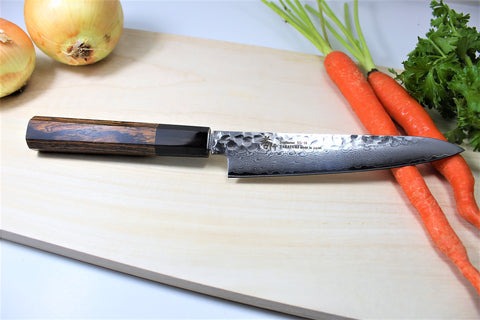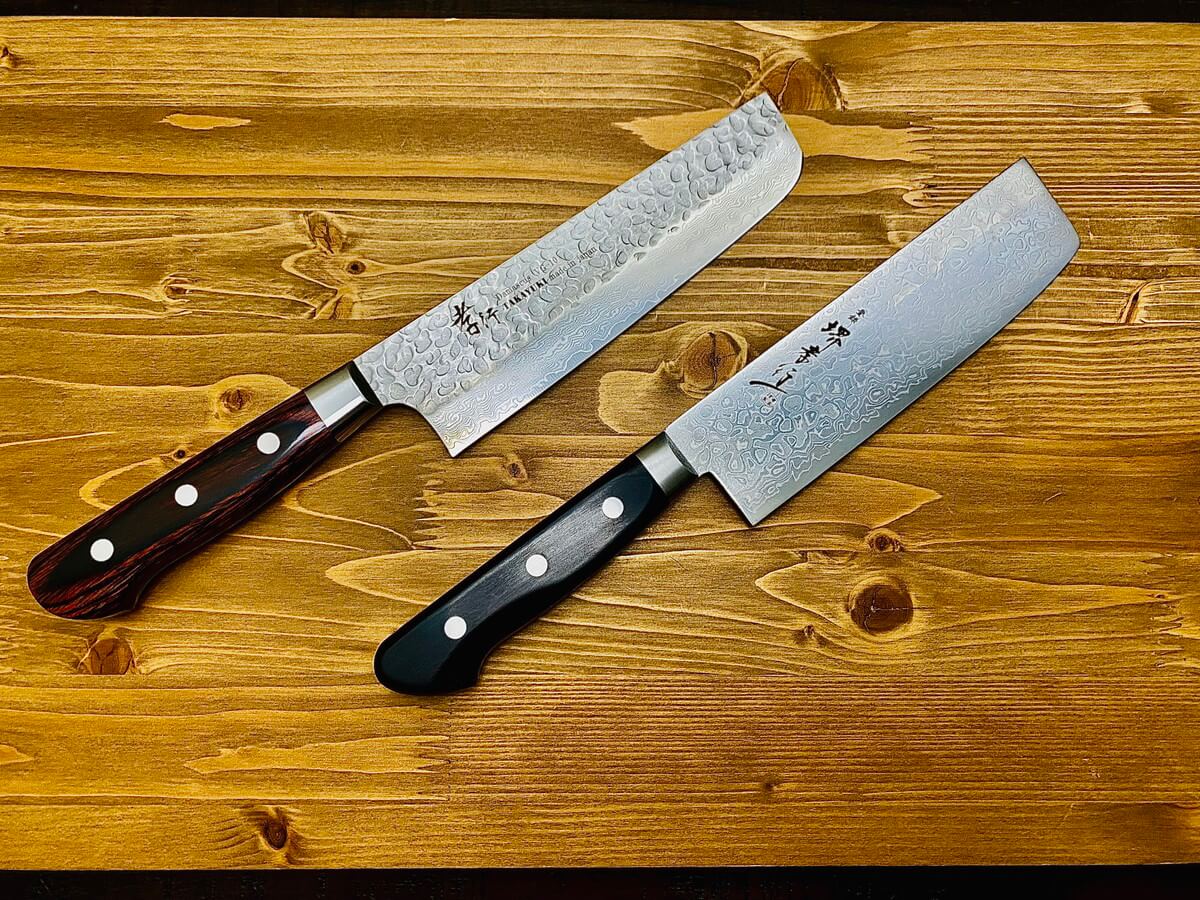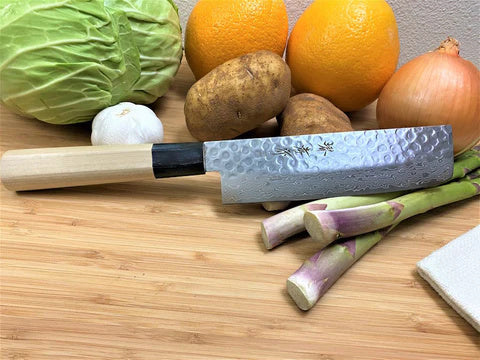
Cleaning Knives The Right Way: Why You Should Handwash
Cleaning knives is essential in caring for them and honoring their heritage, especially for Japanese knives. The artistry of knives has been perfected over centuries. From the katanas of ancient Japan to the beautiful blades in your kitchen, these tools bear the legacy of master artisans. Knowing how to wash a knife ensures you enjoy these embodiments of tradition, precision, and exquisite craftsmanship for many decades.
Chefs and culinary enthusiasts know that a knife becomes an extension of your body. And just like the body, proper care results in peak performance. But how we wash ordinary dirty dishes lacks the caring touch required for Japanese knives.
Let's explore how to care for your Japanese kitchen knives, infusing the spirit of tradition into maintaining these traditional treasures.
Honor the Samurai Spirit and Preserve Sharpness
Like the blades of legendary samurai warriors of old, Japanese kitchen knives from cities such as Sakai, Miki, or Seki are renowned for their razor-sharp edges. Cleaning your knives by hand honors the samurai spirit.
Because of their shared roots, the best way to wash a knife is how a samurai cleaned their katana. As legend has it, the samurai would symbolically wipe them clean after battle with a cloth. Known as chiburui, or "shaking off the blood," this would keep their blades from rusting in their saya.
By paying homage to the discipline and meticulousness of ancient artists and warriors, you exhibit the same care that went into maintaining each blade. This care is the best way to clean a knife. A personal touch creates a connection with the tool. Getting to know your tool allows you to wield it confidently, ensuring that every stroke is precise and every cut is clean.
When you clean your knife by handwashing, you also preserve its sharpness. Without the possible collateral damage from washing machines, you'll enjoy edge retention that speaks to the legacy of the samurai's unwavering dedication to perfection.
Respect Nature’s Harmony and Prevent Corrosion
In Japan, harmony with nature is a way of life. Reliance on the natural world mirrors our dependence on each other. Cleaning your Japanese knives should reflect respect for nature's delicate balance and the connectivity of all things.
The best way to clean a knife is to immerse the blade in gentle, flowing water with natural, eco-friendly detergents. How you care for your Japanese knives represents how you care for the world around you. This mindful approach is noble and will align you with the principles of harmony that shape Japanese culture.
Handwashing also minimizes the risk of corrosion. Instead of leaving steel in wet or humid conditions, cleaning knives by hand keeps them free from rust and ready to use.
Even while cleaning, we can honor the environment. Embracing this idea will keep your knives in pristine condition. Just as the beauty of Japan’s landscapes endures through the ages, the serenity of a still pond or falling rose blossom is present in your kitchen.
Control Over Cleaning Rituals: Embracing the Tea Ceremony
The tea ceremony is an integral part of Kyoto’s cultural heritage. It is a chance to acknowledge the marriage of beauty and function. Considering the artistry and details of our tools symbolizes tranquility and mindfulness. Tea ceremonies have been part of Zen Buddhism and Japanese culture for centuries.
Cleaning your kitchen knives can be elevated to a ritual, mirroring the grace and elegance of the tea ceremony. Just as tea utensils are meticulously handled and cleansed, the best way to clean your knife is with the same reverence.
Embrace the meditative aspect of handwashing your knife. Consider it as a piece of art while recognizing its powerful applications. Carefully select natural cleansing agents, and use gentle motions while washing.
By infusing your cleaning routine with the spirit of the tea ceremony, you imbue your knives with a sense of serenity and honor the ancient traditions of Kyoto.
The Nurturing Act of Caring for Handles
The handles of Japanese kitchen knives often highlight nature’s beauty. The magnolia wood, zelkova, or horn held in your palm exhibits the strength and elegance of our world. Cleaning your knives should be a nurturing act. By preserving these exquisite materials, you treat them with the same respect as the master artisans who crafted them.
The best way to clean a knife is by gently washing the handles. Avoiding excessive moisture and harsh chemicals promotes longevity and beauty, just as Japan’s traditional crafts endure and inspire admiration for generations.
Protection for Peak Performance
Thoughtfully cleaning your knives protects them from damage and keeps their blades razor-sharp. Even more importantly, it elevates the act of maintenance to a profound expression of respect for tradition, nature, and craftsmanship.
How you care for a knife shows respect for Japanese rituals. Embracing the samurai spirit and tea ceremony exhibits discipline and harmony with nature. Nurturing the beauty of traditional materials will deepen your connection to the timeless art of Japanese knife-making.
A mindful approach cares for the heritage of Japanese knives. Enrich your culinary journey with the essence of ancient Japan’s wisdom and grace while maintaining peak performance.
Protect your knife after cleaning with a knife protector or saya. If you have a high-carbon knife, we also recommend using an oil like Camellia oil (Tsubaki oil). A knife roll or something like the Tojiro soft knife case can add extra protection to your precious knife collection!
To learn more, check out our Japanese Knife Blog. We have extensive articles about the best ways to clean and care for your knives and kitchen tools. Elevate your knife skills further by visiting our knife maintenance page for guides on sharpening and general maintenance!



